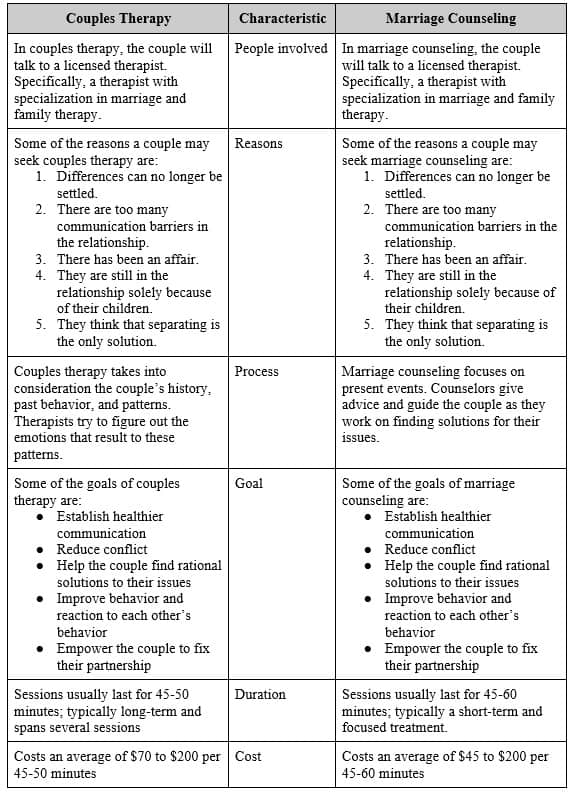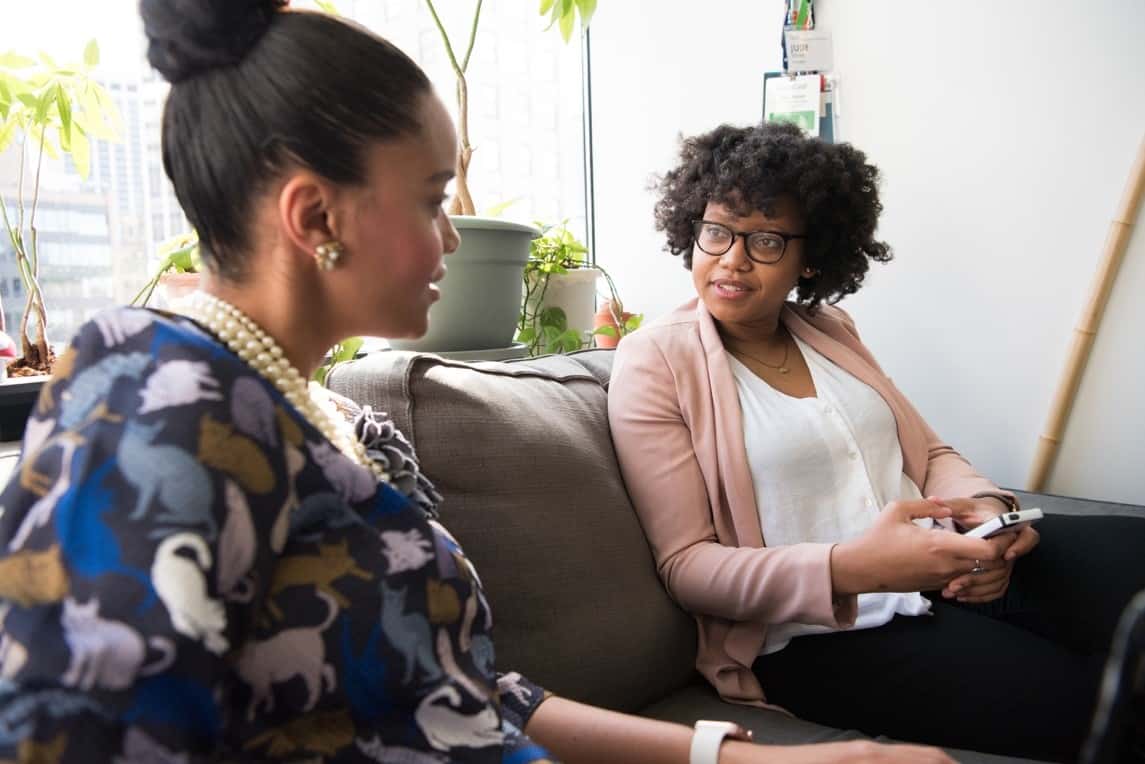Getting married is a momentous occasion in a couple’s life. While filled with joy, couples might not anticipate the challenges and difficulties that come with married life. Navigating these waters can be less daunting with guidance, but it’s essential to know the difference between marriage counseling and couples therapy when seeking help.
Both couples therapy and marriage counseling aim to improve relationships by introducing healthier coping mechanisms and refining communication techniques. They have a lot in common, which is why the terms are often used interchangeably. However, they do exhibit distinct characteristics in their processes, durations, and costs.
Couples therapy and marriage counseling are often used interchangeably because of their many similarities. However, they have several differences that are important to note, such as their processes, durations, and costs.
The Difference Between Marriage Counseling and Couples Therapy
arious organizations and institutions have their own interpretations of these two forms of guidance. Services offered by clinics and professionals can differ widely. To truly grasp the difference between marriage counseling and couples therapy, a side-by-side comparison is beneficial.

The distinction between couples therapy and marriage counseling is nuanced, but it is vital for individuals to understand these nuances to choose the most suitable option for their relationship needs
Couples Therapy

Couples therapy, like any other kind of therapy, aims to assist someone to conquer a mental or emotional obstacle. These obstacles include intimacy issues, communication issues, insecurities, anxieties, and so forth.
Therapists commonly have four major steps for treatment:
- The therapist will attempt to zero in on a specific issue in the relationship.
- The therapist will then mediate a discussion on possible treatments.
- The therapist will set the goals of the treatment.
- Together with the couple, the therapist will set expectations on the changes that must be enacted.
Oftentimes, the therapist will also delve into the couple’s history, both as individuals and as partners. This is to identify unhealthy patterns, unsustainable behaviors, and root causes of problems that are causing a divide in the relationship.
Essentially, the question to be addressed in couples therapy is “Why is our relationship having these problems?” With this, the therapist guides the couple in finding areas of improvement within their relationship.
A couple going through major events such as a life-threatening disease, death of a loved one, and other stress-inducing situations, may seek the assistance of a couples therapist in finding healthy coping mechanisms.
Likewise, a couple in need of advice for simpler matters, relative to those aforementioned, like finding harmony and establishing better rapport in the relationship, can also be helped by a couple’s therapist.
As they are licensed professionals, couples therapists can also deal with matters of mental health. A topic of discussion may be a partner’s depression, anxiety, or bipolarity. With the help of a psychiatrist, a treatment and solution plan can be devised.
Sessions are usually 45 to 50 minutes long. Couples therapy is a long-term endeavor and necessitates several sessions. The cost depends on multiple factors, such as your location and the therapist themselves, but the average price is $80 to $250 per session.
Couples may opt to go together for each session, attend individually, or alternate between the two options. Every couple will have an approach that best fits their dynamic and schedule.
Marriage Counseling

Marriage counselors seek to identify the conflicts in a relationship and help couples establish healthy and constructive methods to come up with solutions to these conflicts.
It is common for couples to seek marriage counseling before getting married to strengthen their relationship before transitioning to a new stage in their life. However, marriage counseling can also be helpful at any point during the marriage.
In contrast to couples therapy, marriage counseling focuses on present events and circumstances. There is an emphasis on timely matters, and in particular, the trials and tribulations of married life. Overwhelmed newlyweds or burned-out long-time partners may turn to the expertise of a marriage counselor to make married life easier to handle.
The focal point of marriage counseling is to equip the couple with better communication and conflict-resolution skills. These two skills are often cited as pivotal in the success of a marriage.
Much like couples therapy, marriage counselors act as a mediator for the partners. They facilitate a dialogue on each of their perceived issues in the relationship. It is important for the counselor to prevent any form of hostility or aggression in this discussion, as it will ultimately result in unproductivity and possibly more damage.
A common tactic is to set realistic rules and boundaries to address the issues.
- If the problem is a partner whose tendency to overwork themselves severely limits their time together or with their children, the counselor can propose that work duties be strictly left to office hours and at the workplace.
- If the issue is a partner constantly looking through the other’s messages and social media, the counselor can recommend the use of passwords for each other’s privacy. It is also important to address that this tendency may be a result of a lack of trust, which the counselor can also remedy by giving them proper communication techniques and teaching them the importance of honesty and transparency in a healthy relationship.
- If the problem is a partner feeling as if the domestic workload is not evenly distributed, the counselor can suggest that they set specific household and child-caring tasks for each other to ensure that they each do a similar amount of work.
Marriage counseling is a useful resource for any kind of issue concerning relationships, such as fidelity, sexual difficulties, communication issues, and conflicting goals or interests. Although they can also address mental health issues, not all marriage counselors have the license for a diagnosis. They may seek the assistance of other healthcare providers such as psychiatrists for these kinds of issues.
Additionally, marriage counselors look for signs that a person is being abused. It is one thing for a partner to have anger management issues, and another thing for them to be downright abusive — marriage counselors can contact the police, shelters, or centers if they feel that their client is in danger.
Sessions are usually 45 to 60 minutes long. Marriage counseling is typically a short-term and focused treatment. Like couples therapy, the cost depends on multiple factors, such as your location and the counselor themselves, but the average price is $60 to $250 per session.
Similar to couples therapy, a couple can attend marriage counseling together or individually. It is generally recommended, however, that they attend together, as finding solutions is easier and fairer if both parties are present.
Final Thoughts
Despite societal progress in acknowledging mental health, there remains a stigma around seeking couples therapy or marriage counseling. Some fear it signifies relationship failure. However, understanding the difference between marriage counseling and couples therapy and opting for the right support can illustrate dedication to relationship improvement and personal growth.
Both forms of support have proven effective in mending relationships and aiding couples in distress. To find a therapist or counselor, consider online directories, referrals from doctors, or recommendations from those who’ve benefited from these services.